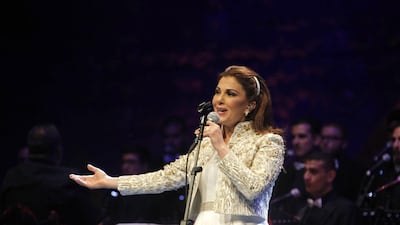Lebanese soprano singer Majida El Roumi has released a music video for the song When Beirut Revives, as Lebanon marks the third anniversary of the catastrophic blast that rocked Beirut port on August 4.
Her song is an homage to the indomitable spirit of the Lebanese people, conveying a message of hope and unity during difficult times. It captures the spirit of a city dreaming of a brighter future.
Introducing the video, which was shot in Lebanon and Egypt, El Roumi dedicates it to those who died in the blast and their families.
"I also dedicate it to the Lebanese people who defied the impossible and endured horrors resulting from successive criminal conspiracies woven against them, a burden no other people in the world could bear," she adds.
"My hope is that we will soon reclaim our free national decision that was taken from us, and that Beirut will return to us safely, sooner rather than later, God willing."
Composed by Yahya Al Hassan, the song brings to life the timeless verses by the late Syrian poet Nizar Qabbani, who penned an equally emotional ode to the Lebanese capital titled Lady of the World, O Beirut – which was revealed for the first time in 1988, during the Lebanese Civil War.
At the beginning of the music video, which is directed by Charbel Youssef, El Roumi appears in the hall of the League of Arab States, where she spots the Lebanese flag and a computer screen with Beirut displayed across it.
Dressed in a Georges Hobeika haute couture gown, she stands gracefully in front of the camera, with a veil of darkness concealing the regal details of her attire. With her perfectly coiffed hair with fringes pinned at the back, the soprano steadfastly maintains her signature appearance, symbolic of the nation's resolve.
Meanwhile, an orchestra and women dressed in black create an emotional atmosphere, charged with pain, sorrow and melancholy – effectively conveying the heart-wrenching reality that Beirut experienced after the explosion.
In its opening verses, the poem encapsulates a vision of a renewed and thriving Beirut, where the scars of the past are healed.
It begins: "When Beirut revives / When Beirut returns to us secure and sound / When Beirut comes back as we knew it / Just like the dove finds solace in its hallowed abode."
The poet later describes the act of casting away his travel documents into the sea, signifying a longing to abandon the troubles of the past and embrace a new beginning. Later renting two chairs in Beit Al Qamar, the poet alludes to a celestial realm where dreams come to fruition.

He continues: "We will spend our time / Spreading folk songs and planting trees."
The song conveys a heartfelt plea for the safe return of the cherished city, echoing Qabbani's sentiments as he yearned for a revived Beirut.
"Oh, Beirut! How wearisome our journey has become. / Embrace us, oh, embrace us / In lovers’ letters / In the melodies of birds / In the downpour of rain so tight.
"Can Beirut, the enchantress, from ruins arise? Can wheat bloom in the sea's embrace? Can the waves carry along some accountability? Can we etch a poem again on almonds or cotton clouds?" El Roumi says she changed a single word of the poem here to make it more timely – swapping in hisaab, or accountability, for kitab, which means book or letter.
El Roumi admits that fate has tired the Lebanese people, with the phrase: "Oh Beirut, fate has burdened us / Embrace us, oh, embrace us / In lovers’ letters / In the melodies of birds / And in the downpour of rain."
The tragic Beirut port explosion remains one of the most devastating events in Lebanon's history, and one that continues to reverberate through the nation's collective memory. However, bolstered by Qabbani's verses, El Roumi's song serves as a poignant tribute to the families of the victims, offering a glimmer of hope and healing.


